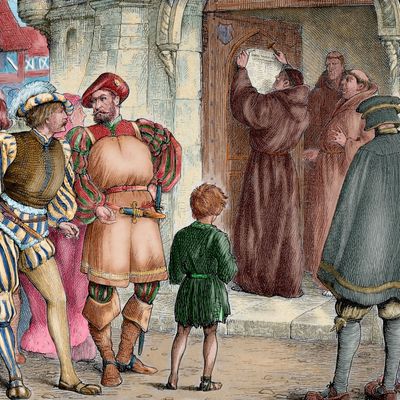
The 500th anniversary of the publication of Martin Luther’s 95 Theses, generally considered the beginning of the Protestant Reformation, is naturally spurring rumination on the current status of Catholic-Protestant efforts to heal the breech in Western Christianity. By most measurements, an enormous amount of ecumenical progress has been made, much of it in the last 75 years. In truth, the Second Vatican Council eliminated or at least ameliorated a good deal of what troubled Luther’s conscience about the early modern Catholic Church: the insistence on Rome’s monopoly on salvation; the elevation of “works” over faith; the denial of direct access to the Bible for laypeople; the deterioration of worship from a communal experience to a clerical ritual aimed at praying people through Purgatory who could afford to pay for that privilege; and assorted other “abuses” that Catholic reformers over the centuries often criticized as well.
After Vatican II, in the United States at least, the average Catholic and Lutheran worship services became very similar, and theological differences shrank even more noticeably, culminating in the remarkable 1999 Joint Declaration on Justification released by the Vatican and the World Lutheran Federation that reconciled the two faith traditions on a central preoccupation of both Luther and his Catholic enemies: the relationship of faith to grace and to salvation. The Declaration was later ratified by many, many churches of the Methodist and Reformed traditions.
And while Catholics embraced what might have previously been considered distinctly Protestant practices, like the use of vernacular languages in worship and acceptance of church-state separation, Protestants (partly as a result of the ecumenical Liturgical Movement that so influenced Vatican II) relaxed their Reformation-era fears of “ritualism,” and even in the more conservative denominations, began to more frequently celebrate communion and respect church traditions. Moreover, virtually all Christians have abandoned some of the more unsavory habits of thought and deed they once shared, from aggressive anti-Semitism to active state-sanctioned persecution of “heretics.”
There remain, of course, serious institutional obstacles to Catholic-Protestant unity, ranging from the papacy and ordination of women to the difficulties involved in getting the diverse Protestant polities to move toward Rome at the same pace. But as Emma Green acknowledges at the end of a long evaluation of ecumenism, difference among Christians these days tend to break along a left-right rather than a Catholic-Protestant spectrum:
The United Methodist Church, which claims 12 million members around the world, and the Anglican Communion, which claims 85 million, have both experienced bitter conflicts in recent years over LGBT issues. These divisions have been driven in part by the different orientations of relatively progressive American churches and their relatively conservative counterparts in Africa and other parts of the global South.
While these disagreements have led to painful splits — both denominations face the possibility of schism in the coming years — they also suggest that a growing number of Christians are organizing themselves based on ideological convictions, rather than a shared confessional tradition.
That’s an understatement, particularly when it comes to Christians in the United States. Virtually every Protestant denominational tradition has now divided into liberal “mainline” and conservative fundamentalist groupings, even as Catholics have more subtly divided into “modern” and “traditionalist” camps. And while LGBT issues are often at the forefront, there are theological differences underneath that are nearly as irreconcilable-seeming as those that caused the Reformation. Advocates of biblical literalism, a tenet of Protestant dogma that emerged in the 20th century in reaction to liberal theology, are making common cause with conservative Catholics (and Orthodox) on a wide range of issues involving politics and culture, most obviously reproductive rights and more generally the role of women in family, church, and society. The Francis papacy with its startling reevaluation of many Catholic traditions seems to have radicalized many conservative Catholics, who not only stress reactionary cultural themes but also join conservative Protestants in regarding capitalism with a sort of holy awe.
Among Protestants, it is sometimes difficult to think of the president’s favorite cleric, Jerry Falwell Jr., and Moral Mondays’ William Barber II, as fellow Christians — much less fellow Protestants — from adjoining states.
In any event, the combatants of the Reformation era would barely recognize the Church today. Christians no longer fight and kill each other over the metaphysical nature of the bread and wine on communion tables, or burn each other’s churches. But they wage wars of words with each other nonetheless, even as religious belief steadily declines and the idea of “Christendom” fades.






























